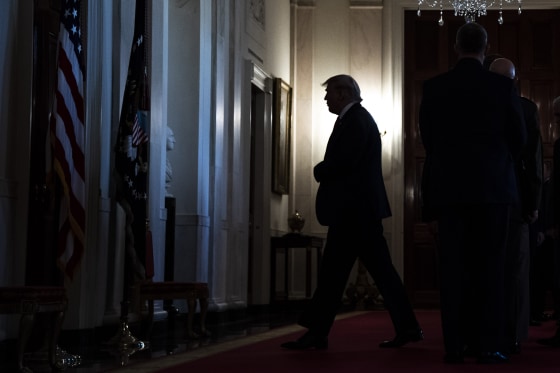WASHINGTON — Developments on Friday could put the start date of arguments in the Senate impeachment trial of President Donald Trump around a week from Tuesday, Jan. 21, the day after the Martin Luther King Jr. holiday.
And that raises the possibility that the trial may not be over before the real kickoff of the 2020 presidential primary contest on Monday, Feb. 3, at the Iowa caucuses.
So what does that mean for the Senate and for Trump?
On Jan. 21, Trump is expected to be in Davos, Switzerland, for the World Economic Forum annual meeting. It's possible the White House may ask for more prep time to get ready for the trial, delaying it until Trump is back in the country later that week.
The expectation is that it would likely take some time for opening arguments in the trial to begin once the House transmits the articles of impeachment to the Senate, which could happen next week, House Speaker Nancy Pelosi, D-Calif., indicated on Friday. In 1999, during President Bill Clinton’s impeachment, there were eight days between when the Senate received the articles and when arguments began.
Before all of that happens, Pelosi needs to publicly introduce the names of her impeachment managers. Then, at some point after that resolution passes, the articles will be sent to the Senate.
There are several steps that need to be completed in the Senate before opening arguments can begin:
- Supreme Court Chief Justice John Roberts needs to administer the oath to senators.
- The Senate needs to debate and pass a resolution establishing the rules and timeline for the initial part of the trial (this would be where they would likely adopt the rules package that McConnell says he has the votes to pass without any Democratic support).
- There also may be a few days of preparation, during which both sides put together their arguments.
While McConnell has said the procedural resolution establishing the trial guidelines will be largely the same as the Clinton trial, there are questions about when, for instance, a GOP motion to dismiss the articles would be considered, if at all.
Once arguments begin, both sides will likely be given 24 hours, spaced out over a number of days, to make their cases, and senators will get 16 hours to submit questions to both sides, which, again, will be spaced out over a number of days. That's how things ran at Clinton’s trial in 1999, and McConnell's office expects for that to remain the same.
What votes the Senate holds on motions to dismiss (or censure Trump) will depend on what lawmakers include in the resolution for the trial, and that won't be known until it's released by McConnell’s office after the impeachment articles are sent over by Pelosi.
So, how long will the Trump trial last?
A key factor for knowing the timeline will be whether the Senate agrees to seek testimony from witnesses — and that won't be determined until after the opening arguments phase of the trial is over.
In the 1999 Clinton trial, there were 22 days between the Senate receiving the articles of impeachment and the Senate vote on the resolution to have witnesses appear. In that trial, there were 37 days between the day the Senate received the articles of impeachment and the vote to acquit Clinton.
However, that timeline could be truncated for Trump.
Arguments may not take as long as they did in the Clinton trial, and senators may get antsy as they sit silently in the chamber, without their phones, watching speeches and arguments all day. The 2020 election will also play into the trial timeline, with the five Democratic senator-candidates likely hoping to get back on the campaign trail ahead of the Feb. 3 Iowa caucuses — assuming they haven't already taken place.
And don't forget what happens the day after the Iowa caucuses.
The president is set to deliver his State of the Union Address on Feb. 4. He wouldn't be the first impeached president to address those considering his fate. It happened with Clinton, too, in January 1999.


